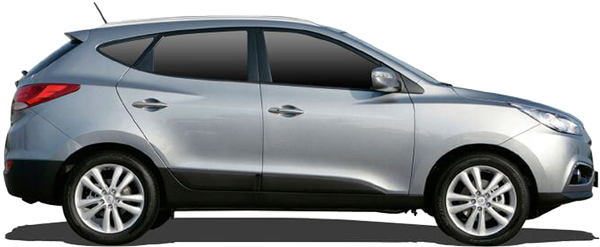The Comparative Analysis :
Audi Q3 2.0 TFSI quattro S tronic (11 - 14) vs. Hyundai ix35 Fuel Cell (15 - 18)
€ 37,500

€ 65,500

€ 37,500
Base Price ⓘBase price of a new vehicle with standard equipment in Germany at market launch.
€ 65,500
ⓘBase price of a new vehicle with standard equipment in Germany at market launch. Price Info
Vehicle Dimensions
The dimensions of these vehicles differ slightly. The Audi Q3 2.0 TFSI is an inch shorter, 0.4 inches wider and 2.6 inches lower than the Hyundai ix35 Fuel Cell.
Audi Q3 2.0 TFSI
Hyundai ix35 Fuel Cell
62.6
72.1
79.5
65.2
71.7
82.7
72.1 in
Width
71.7 in
79.5 in
Width Incl. Mirrors
82.7 in
62.6 in
Height
65.2 in
102.5
172.6
103.9
173.6
172.6 in
Length
173.6 in
102.5 in
Wheelbase
103.9 in
Vehicle Weight
Audi Q3 2.0 TFSI
Hyundai ix35 Fuel Cell
3616 lb
Curb Weight
4235 lb
4773 lb
Gross Vehicle
Weight
Weight
4960 lb

Weight Difference:
619 lb
14.62 %

General
Audi Q3 2.0 TFSI
Hyundai ix35 Fuel Cell
8U
Generation
EL
Sport Utility Vehicle
Car Body Style
Sport Utility Vehicle
Mid-Grade Unleaded
Fuel Type
Hydrogen

Permanent all-wheel drive (AWD)
Drivetrain
Front-wheel drive

7-speed dual clutch transmission
Transmission
1-speed automatic transmission
Engine
Audi Q3 2.0 TFSI
Hyundai ix35 Fuel Cell
Straight-four gasoline engine with turbocharger
Engine Type
Asynchronous motor
CPSA
Engine Code
4
Valves
0
4
Cylinders
0
2 L / 98 cu in
Displacement
0 L / 0 cu in
208 hp
at 5000 rpm
Power
134 hp
at 0 rpm
Audi Q3 2.0 TFSI
208 hp
134 hp
Hyundai ix35 Fuel Cell
221 lb‑ft
at 1800 rpm
Max. Torque
221 lb‑ft
at 0 rpm
Audi Q3 2.0 TFSI
221 lb‑ft
221 lb‑ft
Hyundai ix35 Fuel Cell
Performance
Audi Q3 2.0 TFSI
Hyundai ix35 Fuel Cell
143 mph
Maximum Speed
99 mph
6.9 sec
Acceleration 0 to 62 mph
12.5 sec
62 mph
62
mph
mph
315 ft
0.000 sec

Audi Q3 2.0 TFSI
62 mph
62
mph
mph
571 ft
0.000 sec

Hyundai ix35 Fuel Cell
▶ REPLAY
17.38 lb/hp
Weight-to-Power Ratio
31.6 lb/hp
Audi Q3 2.0 TFSI
17.38 lb/hp
31.6 lb/hp
Hyundai ix35 Fuel Cell
Fuel Economy / Emissions
Audi Q3 2.0 TFSI
Hyundai ix35 Fuel Cell
Fuel Economy
31 mpg
combined ✽ per 100 miles
1.6 kg H2✽
( 62 MPGe ⓘ Miles per gallon gasoline equivalent (MPGe) is a measure of the average distance traveled per unit of energy consumed. MPGe, specified in miles per U.S. gallon, is used to compare the energy consumption of vehicles that use different energy sources.)
Audi Q3 2.0 TFSI
31 mpg
62 MPGe
Hyundai ix35 Fuel Cell
23 mpg
city
1.4 kg H2
No data
highway
1.6 kg H2
16.9 gal
Fuel Tank Capacity
5.6 kg
516 mi
Range
348 mi
Audi Q3 2.0 TFSI
516 mi
348 mi
Hyundai ix35 Fuel Cell
Environmental Impact
145.8 kWh
Total Energy Consumption
per 100 miles ⓘThe total energy consumption per 100 miles is the amount of energy consumed by a vehicle when burning fuel or using electricity per 100 miles (final energy), and the energy required to produce the appropriate amount of fuel or electricity (primary energy).
per 100 miles ⓘThe total energy consumption per 100 miles is the amount of energy consumed by a vehicle when burning fuel or using electricity per 100 miles (final energy), and the energy required to produce the appropriate amount of fuel or electricity (primary energy).
131.5 kWh
Audi Q3 2.0 TFSI
145.8 kWh
131.5 kWh
Hyundai ix35 Fuel Cell
Euro 5
Emission Standard
Brennstoffzelle (Wasserstoff)
288 g/mi (NEFZ)
CO2 Emissions
0 g/mi (NEFZ)
Practical Convenience
Audi Q3 2.0 TFSI
Hyundai ix35 Fuel Cell
5
Doors
5
5
No. of Seats
5
1157 lb
Maximum Payload
725 lb
13 cu ft
Trunk Volume
16.7 cu ft











38.7 cu ft
Cargo Volume (Seats Down)
40.7 cu ft


















